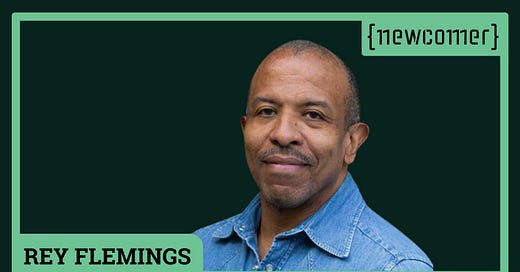I spend most of my time here talking about how people earn their money.
Rey Flemings, the chief executive of the YC-backed startup Myria, is an expert at helping people spend it.
For several years, Flemings ran a luxury services consultancy for family offices. In other words, he threw parties in Las Vegas, introduced billionaires to celebrities, rented out private mansions, and helped people acquire things money can’t usually buy.
These days, Flemings is building a startup around the same concept. Letting rich people buy what isn’t on the market. He’s building a marketplace for off-market travel and accommodations. On top of that, he’s spinning up a social network for the ultra wealthy.
Flemings says his average member’s net worth is about $600 million.
I sat down with Flemings to talk about his startup and to understand how Silicon Valley’s most successful people are spending the fantastical sums that they’ve earned in the past few years.
He warned about the unhappiness that sudden fortune can bring, calling it “the success condition.”
We’re all humans. We’re all chasing the American Dream. We’re all chasing success. And when you achieve it, one of the first discoveries that people are shocked by is that you have to pump the brakes. Money doesn’t buy happiness. I was talking with a new client the other day and he said, “Ray, I can’t talk about this publicly, the world would play the world’s smallest violin, but the day I exited triggered the deepest and greatest period of depression in my life.”
Give it a listen.
Highlighted Excerpts
The transcript has been edited for clarity.
There is a phenomenon in Silicon Valley where someone suddenly becomes rich, especially when their entire net worth is tied up in a startup. Finally, they sell the company and now have all this money, but don't really know how to be wealthy or what to buy. What typically happens when somebody sells their company for a billion dollars and gets 300 million of it?
Rey Flemings: First of all, there’s no one-size-fits-all answer, right? We’re different. Significant, sudden, great wealth does come with a particular set of challenges. Zooming out across 15-17 years in this space and looking at all of the folks that work here, zoom all the way out. Let’s just focus on first-generation people who are operating a business and/or they’re doing something presently to amass that wealth. I’ve worked with probably 100-125 folks in that category. I hear the same things over and over, so often that we have even coined a name for it — we call it the Success Condition.
It goes something like this: We’re all humans. We’re all chasing the American Dream. We’re all chasing success. And when you achieve it, one of the first discoveries that people are shocked by is that you have to pump the brakes. Money doesn’t buy happiness. I was talking with a new client the other day and he said, “Ray, I can’t talk about this publicly, the world would play the world’s smallest violin, but the day I exited triggered the deepest and greatest period of depression in my life.”
What ends up happening is we chase the American Dream only to realize it and then we’re like “Wait, why am I not happy? What’s missing here?”
Rich people get sad, depressed and commit suicide just like anyone else. Studies show that beyond about $100,000 a year, any more money doesn’t actually contribute to human happiness. The wealthier and more successful you become, the harder it is to form close interpersonal relationships with people that aren’t in your network.
Break down what was the motivation to do Y Combinator and build more of a tech platform for Myria?
Rey: Fantastic question, Eric. I’d love to sound like I had this all planned out and was so smart with so much foresight. I knew I wanted to build a scalable business with my background. But when I started The Blue, I ran it for 5-6 years before we could start Myria. It was complicated. How do you scale services? Many say you can’t scale services. If so, what do you scale and how? How do you keep customers happy who want white glove service and personalization? How do you provide that special touch at scale? These are really hard problems to solve.
I grew that business bootstrapped to about $60 million GMV annually. If you do that, you stay busy. I didn’t know my kids, family, or myself. I was always on a plane, just work, work, work. That’s not sustainable.
At least you get to go to parties sometimes?
Rey: Yeah, almost always in that business. I just celebrated my 50th birthday. I don’t have to tell you I didn’t want to spend the rest of my life on a plane in a suit. That’s no way to live.
It turns out that when we started Myria, we asked clients what they wanted. Ninety-two percent of requests fell into just three categories.
People wanted our global travel product — not just booking a flight or kayak to Toledo. Really crazy, experiential travel beyond a private jet. When you get off the private jet, what happens? The best things in the world you can’t find on Google. If you can’t search for them, how do you know what’s on the menu? There’s a whole universe of off-market awesomeness in every category, but no one tells you about them because they aren’t online.
Travel experiences, people, and assets. When you’re running a big company, you have an amazing team. When you hit $300 million net worth, you probably move to a single family office with teams managing your wealth. But for your personal life, even with household employees, you want to relax at home. A person worth $3 billion wouldn’t run their company with one person, but their personal life becomes a multi-billion dollar enterprise with homes, kids, divorce, assets everywhere. Assistants work hard but can’t be experts in everything billionaires need help in.
We asked clients what they wanted and 92% of requests were in three categories. Also, there are about 20 markets ultra wealthy care about. If we have great coverage in those categories in those markets, we’ve covered nearly all use cases.
I’ve always wondered — if I’m at Bezos’ level of wealth, do I try to get everybody who interacts with me to sign an NDA? Especially if I’m out partying on a yacht, is everybody at that party signing something to keep things confidential?
Rey: On the Myria platform, everyone who sells to our members is automatically under binding arbitration. The wealthy are targets for frivolous litigation. We try to prevent that.
In real life, if you’re hosting a party, many will request or demand NDAs and lock up phones, like Dave Chappelle style with magnetically locked bags. I think that’s good considering phone addiction. You’ve thrown a million dollar party for people’s enjoyment but they just look at their phones. But there are gaps. I can share a horror story.
We did an expensive, innocent party at an incredible estate with famous people relaxing and having fun — nothing unprintable. But no one wanted cameras in their face while relaxing Someone who signed the NDA went to the press implying we discriminated by only having women sign NDAs, not the men. The men were dear friends of the client, so they didn't have to sign. Sometimes NDAs can backfire.
Do you require NDAs for everything?
Rey: We try to on the platform but nothing substitutes for having a good group of trustworthy people, which is harder as you become more successful. It’s become a sport to vilify the rich, making it harder to form close relationships outside your network.














Share this post